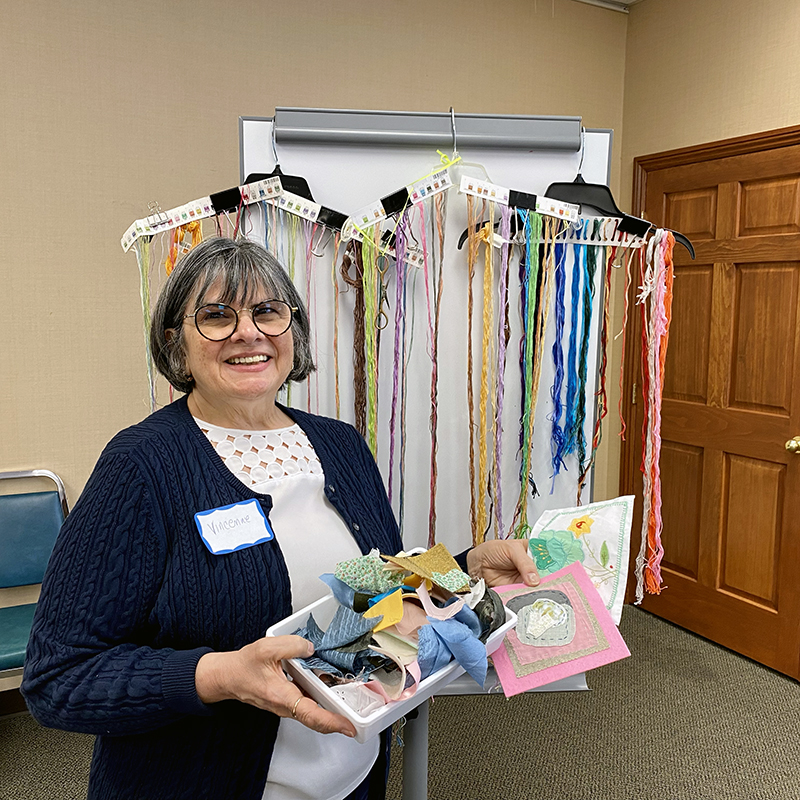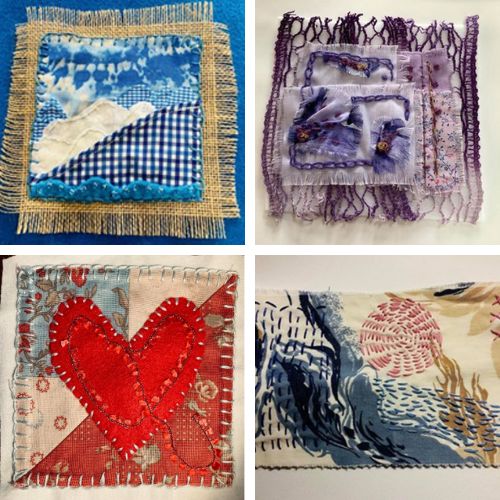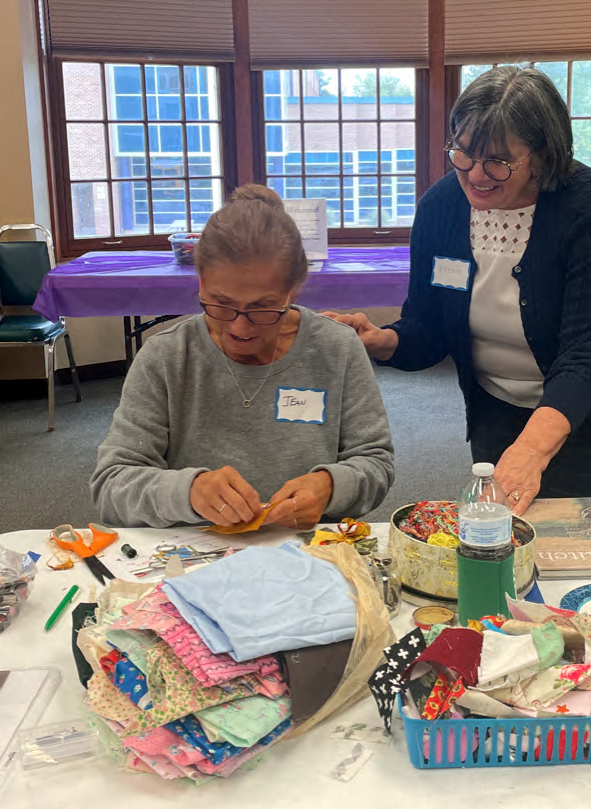School of Education Professor Vincenne Revilla Beltrán, Ph.D., Shares Research on Hand-Stitching and Mental Health Throughout the Pittsburgh Region Tuesday, October 11, 2022

With just two simple stitches, some fabric scraps and a breathing exercise, Vincenne Revilla Beltrán, Ph.D., emphasizes the importance of process over result, the journey over the destination.
"There are no mistakes. Be comfortable, and be fearless," she says.
A professor in Point Park University's School of Education, Revilla Beltrán has spent the last couple of years researching the powerful connection between mental wellness and meditative hand-stitching, the practice of creating small hand-stitched collages with threads and fabric swatches. She recently taught a series of free workshops at area libraries for the broader Pittsburgh community to benefit from learning the relaxing craft. She is planning additional workshops this fall and next spring at several local libraries, and she hopes to hold workshops on campus at Point Park for students, faculty and staff in the future.
"All of these presentation sessions combine my research, love of teaching, dedication to mental health and self-care and the benefits of stitching," she said.

Dr. Revilla Beltrán's handstitch collages
Revilla Beltrán has practiced hand-stitching for several years, and at the start of the pandemic, she quickly identified a way to use her talents to lift the spirits of her students.
"I have a lot of contact with my students," she said. "I was really concerned about many of them with their stress levels. I asked each of them for their favorite color and a favorite word, like purple and blessings, or blue and hope."
Revilla Beltrán then created a hand-stitched collage inspired by the provided color and word and mailed it to the student as a way to connect during a time of distance. All told, she sent out about 75 collages to students, alumni and colleagues during the pandemic.
Mental health, self-care and wellness are among Revilla Beltrán's chief research interests. She has practiced Buddhist meditation for more than 30 years, and she is a licensed counselor and board-certified coach. At Point Park, she is among several School of Education professors certified as instructors in Youth Mental Health First Aid (YMHFA), a program from the National Council for Mental Wellbeing that seeks to teach parents, family members, caregivers, teachers, school staff, peers, neighbors, health and human services workers and others how to help a child who is experiencing a mental health or addictions challenge or is in crisis. Education students at Point Park now receive YMHFA training as part of their pre-service teaching preparation.
"Youth Mental Health First Aid is a lot about intervention, reassurance and referrals," she said. "You're there to provide a bridge for the person."
During the pandemic, Revilla Beltrán took courses through the Devon Recovery Learning Community in England to learn more about hand-stitching as a therapeutic practice. She was especially moved by how World War I soldiers in England were taught hand-stitching as a way to cope with what is now known as PTSD. She also learned about the recovery learning community model, a holistic public health approach based on many pathways toward recovery to build resilience, wellness and self-care for those who have experienced trauma or mental distress.
"It's about latching onto something that is meaningful and provides hope," she said. "I started collecting all kinds of hand-stitching supplies so that when the pandemic was over, I would be prepared and ready to go to share these lessons and this craft with others. My current and future research involves putting all of these pieces together using the recovery model to help people who are experiencing or have experienced mental health challenges or traumas. Things are still unfolding for me."
The first hand-stitching workshop Revilla Beltrán taught was in Sharpsburg, the town her grandparents immigrated to after coming to the U.S. through Ellis Island.
"I get emotional when I think about it," she said. "My grandparents had experienced trauma. They left everything behind because conditions were so bad in their home country. It was meaningful for me to start this process in a place where my family started a process with hope in their hearts. Recovery is about hope."

Dr. Revilla Beltrán instructs an attendee at a workshop.
During a recent workshop at Shaler North Hills Library, Revilla Beltrán noted several similarities between meditation and hand-stitching, such as stress relief, lowering blood pressure and improving focus. She discussed the history of hand-stitching, instructed attendees on how to get started and provided a rainbow of materials for them to create with, empowering and encouraging them along the way, just as she does for her Point Park students. The work speaks to one of Revilla Beltrán's main teaching mantras, "Maslow before Bloom," which means before a student can learn, their basic needs must be met.
"If students are anxious or preoccupied with something in their lives, they will struggle with learning," she said. "I've always been student-focused and student-oriented. Now it takes on an even deeper meaning having gone through the pandemic with students."

